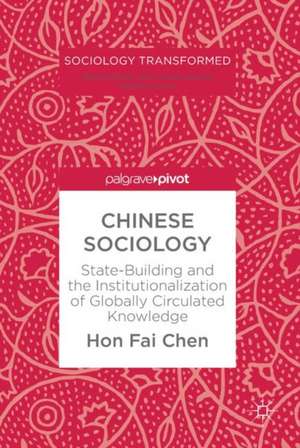Chinese Sociology: State-Building and the Institutionalization of Globally Circulated Knowledge: Sociology Transformed
Autor Hon Fai Chenen Limba Engleză Hardback – 6 oct 2017
This book examines the institutional development of Chinese sociology from the 1890s to the present. It plots the discipline’s twisting path in the Chinese context, from early Western influences; through the institutionalization of the discipline in the 1930s-40s; its problematic relationship with socialism and interruptions under Marxist orthodoxy and the Cultural Revolution; its revival during the 1980s-90s; to the twin trends of globalization and indigenization in current Chinese sociological scholarship. Chen argues that in spite of the state-building agenda and persistent efforts to indigenize the discipline, the Western model remains pervasively influential, due in large part to the influence of American missionaries, foundations and scholars in the formation and transformation of the Chinese sociological tradition. The history of Chinese sociology is shown to be a contingent process in which globally circulated knowledge, above all the American sociological tradition, has been adapted to the changing contexts of China. This engaging work contributes an important country study to the history of sociology and will appeal to scholars of Chinese history and disciplinary historiography, in addition to social scientists.
Din seria Sociology Transformed
-
 Preț: 383.93 lei
Preț: 383.93 lei -
 Preț: 383.93 lei
Preț: 383.93 lei -
 Preț: 381.98 lei
Preț: 381.98 lei -
 Preț: 382.75 lei
Preț: 382.75 lei -
 Preț: 384.31 lei
Preț: 384.31 lei -
 Preț: 381.59 lei
Preț: 381.59 lei -
 Preț: 382.36 lei
Preț: 382.36 lei -
 Preț: 382.57 lei
Preț: 382.57 lei -
 Preț: 385.62 lei
Preț: 385.62 lei -
 Preț: 418.83 lei
Preț: 418.83 lei -
 Preț: 419.43 lei
Preț: 419.43 lei -
 Preț: 385.25 lei
Preț: 385.25 lei -
 Preț: 385.62 lei
Preț: 385.62 lei -
 Preț: 383.33 lei
Preț: 383.33 lei -
 Preț: 382.36 lei
Preț: 382.36 lei -
 Preț: 416.54 lei
Preț: 416.54 lei -
 Preț: 385.25 lei
Preț: 385.25 lei -
 Preț: 237.37 lei
Preț: 237.37 lei -
 Preț: 347.04 lei
Preț: 347.04 lei -
 Preț: 349.91 lei
Preț: 349.91 lei -
 Preț: 352.41 lei
Preț: 352.41 lei -
 Preț: 354.54 lei
Preț: 354.54 lei -
 Preț: 315.95 lei
Preț: 315.95 lei -
 Preț: 343.00 lei
Preț: 343.00 lei -
 Preț: 382.75 lei
Preț: 382.75 lei -
 Preț: 450.88 lei
Preț: 450.88 lei -
 Preț: 483.92 lei
Preț: 483.92 lei -

-

-

Preț: 451.48 lei
Nou
Puncte Express: 677
Preț estimativ în valută:
86.39€ • 90.44$ • 71.48£
86.39€ • 90.44$ • 71.48£
Carte tipărită la comandă
Livrare economică 05-19 aprilie
Preluare comenzi: 021 569.72.76
Specificații
ISBN-13: 9781137582195
ISBN-10: 1137582197
Pagini: 149
Ilustrații: IX, 149 p.
Dimensiuni: 148 x 210 mm
Greutate: 0.35 kg
Ediția:1st ed. 2018
Editura: Palgrave Macmillan UK
Colecția Palgrave Macmillan
Seria Sociology Transformed
Locul publicării:London, United Kingdom
ISBN-10: 1137582197
Pagini: 149
Ilustrații: IX, 149 p.
Dimensiuni: 148 x 210 mm
Greutate: 0.35 kg
Ediția:1st ed. 2018
Editura: Palgrave Macmillan UK
Colecția Palgrave Macmillan
Seria Sociology Transformed
Locul publicării:London, United Kingdom
Cuprins
Introduction.- Chapter 1: Achievement without Coherence: The Rise of Chinese Sociology.- Chapter 2: Dramatic Rebirth: The Suspension, Reestablishment and Institutionalization of Chinese Sociology.- Chapter 3: Paradigm Shift: Sociological Theory and the Studies of Social Transformation.- Chapter 4: Diversity within Limits: Post-Positivism, Gender Studies and the Sociology of Consumption.- Chapter 5: Friends, Not Enemies: The Globalization and Indigenization of Chinese Sociology.- Conclusion.
Notă biografică
Hon Fai Chen is Assistant Professor of Sociology and Social Policy at Lingnan University, Hong Kong. His research interests include social theory, historical sociology and China studies. He is the author of Catholics and Everyday Life in Macau (2017), and Civilizing the Chinese, Competing with the West: Study Societies in Late Qing China (2017).
Textul de pe ultima copertă
This book examines the institutional development of Chinese sociology from the 1890s to the present. It plots the discipline’s twisting path in the Chinese context, from early Western influences; through the institutionalization of the discipline in the 1930s-40s; its problematic relationship with socialism and interruptions under Marxist orthodoxy and the Cultural Revolution; its revival during the 1980s-90s; to the twin trends of globalization and indigenization in current Chinese sociological scholarship. Chen argues that in spite of the state-building agenda and persistent efforts to indigenize the discipline, the Western model remains pervasively influential, due in large part to the influence of American missionaries, foundations and scholars in the formation and transformation of the Chinese sociological tradition. The history of Chinese sociology is shown to be a contingent process in which globally circulated knowledge, above all the American sociological tradition, has been adapted to the changing contexts of China. This engaging work contributes an important country study to the history of sociology and will appeal to scholars of Chinese history and disciplinary historiography, in addition to social scientists.
Caracteristici
Highlights the institutional and historical factors shaping the development of Chinese sociology Demonstrates the state's central role in shaping the Chinese sociological community by charting the flow of material, organizational and symbolic resources Argues that while state-building projects are beneficial for the institutionalization of sociological knowledge, their impact on intellectual diversity and creativity is more ambiguous Includes supplementary material: sn.pub/extras
